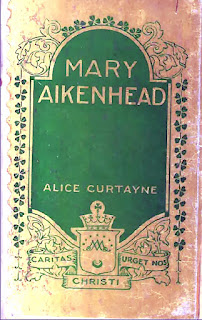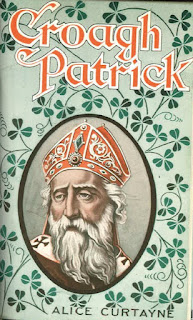Mary Aikenhead
Foundress of the Irish Sisters of Charity
Alice Curtayne
Anthonian Press
1935
I first encountered the works of Alice Curtayne in 2018, since then I have read works by her titles 28 times. I have been slowing tracking down all her volumes. If my research is accurate she wrote 22 books, 10 booklets or tracks, she was an editor and translator of 2 volumes. She also contributed numerous articles to various newspapers, magazines and religious publications. Some of her volumes I have read a number of times. I read this one without knowing anything about the subject before beginning. Most of Curtayne’s works never had North American editions. I have had a hard time finding them. Recently I discovered that the National Library of Ireland will scan out of print books for a price. And this is one of the volumes I tracked down that way. The title page of the volume has this information:
The Servant of God
Mother Mary Aikenhead
Foundress of the Irish Sisters of Charity
1787-1858
It is one of a number of volumes she wrote for the Anthonian Press. I have no description or dust jacket information from this volume. The back cover of this volume was missing. There are 8 full page photos or pen and ink illustrations in the volume. I highlighted several passages when reading this volume. Some of them are:
“The mysterious workings of her father 's mind resulted, however, in two circumstances that were providentially fortunate for Mary: these were the abiding influence of her foster-parents and the fact that she had to grope her own way to the Faith.”
“Mary grew into a sturdy child, who shared in all the Catholic devotions of that humble household. She played about the cottage door with the poorest children of the neighbourhood and formed a curious circle of friends, whom she deeply loved for the remainder of her life.”
“She acquired, in unconscious simplicity, that sense of an abiding Presence which permeates the country homes of our land. Twenty years later she was to sift all the Rules and Constitutions of religious Orders in an effort to find a systematic explanation of "that most fruitful principle of the Presence," and a regular method for realising it.”
“One year after her father’s death, having seen him become a convert to her mother’s Faith at the ultimate hour, Mary Aikenhead was finally received into the Catholic Church. This was in the year 1802, when she was sixteen. Having had to struggle for this anchorage, she never again in her life suffered the temptation to under-estimate its significance.”
“Do not imagine that she became a prig in this process of self-education. She knew how to enjoy herself too. She grew up to very gracious womanhood: tall, with chestnut hair, dark grey eyes, aquiline nose, and a face informed with a spiritual beauty which remained in the memory. She dressed well and she was always a popular partner at dances.”
“Mrs. O'Brien could give Mary Aikenhead thoroughly enjoyable entertainment in the girl's periodic visits to the capital, and at the same time foster instead of spoil her young friend's growing religious vocation. The idea of becoming a nun was, in fact, crystallising in Mary's mind. During one of her visits to Mrs. O'Brien in Dublin, she made the acquaintance of one Father Daniel Murray, and this proved to be the most momentous friendship of her whole life.”
“Let it not be misunderstood when I say that the function assumed by Dr. Murray towards Mary Aikenhead reminds one inevitably of that work undertaken by St. Benedict on behalf of his sister, Scholastica; and that their friendship recalls the candid fellowship existing between Francis and Clare ; Blessed Jordan of Saxony ant Diane; Teresa and John of the Cross; Catherine of Siena and Blessed Raymond ; Francis de Sale and Jeanne de Chantal.”
“She wanted a religious Order that would permit her to continue her combat with poverty and pain on its own ground ; that would permit her to organise an army behind her in the same cause that would permit her to move freely about the streets. Finally, she wanted a Constitution so framed as to mould and support such an army of relief-workers that they might not faint by the way.”
“This new Irish Congregation founded by Mary Aikenhead under the direction of Dr. Murray was a complete novelty in the Ireland of 1815: an Order of nuns without enclosure. It should be held in mind, for the appreciation of this venture, that Mary Ward had barely succeeded in founding such an Order in England two hundred years previously; she had had to work against most painful opposition, and in the face of the bitterest hostility to the "Galloping nuns," as they were termed. And many decades after Mary Ward both St. Francis de Sales and St. Vincent de Paul had virtually failed to found such an Order as Mary Aikenhead had contemplated. Both had, in the end, to be content with something less.”
“After the first Feast of the Congregation had been celebrated with great solemnity, the two first Irish Sisters of Charity, Mary Aikenhead and Alicia Walsh, known in religion as Mother Augustine and Mother Catherine respectively began to visit the sick poor in their own homes. This was the first time in Ireland that nuns were seen walking through the city streets, penetrating byways and obscure purlieus, too, in their work of direct service to the poor.”
“Fifteen years after her return to Dublin, she opened new and very efficient schools for children in Gardiner Street, and this convent soon became the great mission house of the Congregation. The Sisters radiated out from it' to the sick poor of all the neighbouring parishes, and they also served free meals in a large room adjoining the schools.”
“From the moment that Mary Aikenhead, fortified by training, returned to her service of the poor, the plan of a great free hospital began to glimmer in her mind. But it was nineteen years before this great dream of hers could be realised, and it took the ravages of a plague in Ireland before she could peTu-ua.de authority of the dire need for such an institution.”
“Even when strengthened by such Constitutions as had been framed for her assistance, and by the Ignatian Rule, Mary Aikenhead, in her first mission as a nun through the slums, was almost crushed by a conviction of helplessness. There is a sense in which she experienced the defeat of charity. The magnitude of the evil was overpowering.”
“St. Vincent's was the first hospital, organ· and staffed by women, to be opened in the islands. It is now one of many such, but it distinction as a pioneer must not for that reason suffer eclipse. It was opened on the principal that charity to be effective, must be exercises on the most strictly scientific lines. It has never lost sight of that initial charter. When Florence Nightingale in a difficult period was desperately casting about her for some means of becoming trained as a nurse, it was to St. Vincent's Hospital she applied, as to what was admittedly the leading training-school of her time.”
“At the same time negotiations were in progress for sending a band of missionary Sisters to Sydney for the purpose of working among the female convicts of Van Diemen's Land and elsewhere. Six Sisters of Charity volunteered for this most difficult of missions; one of them died before the negotiations were complete, and the other five sailed from Ireland during the month of August, 1878. The adventures of those five pioneers, or their harrowing and repellent work in the Pagan and depraved Australia of one hundred years ago, cannot be recounted in detail in a paper such as
this. But they carried a torch with them by means of which they enkindled a great conflagration. To-day, after an interval of ninety-seven years, there are in Australia twenty-four houses of the Sisters of Charity: these convents include boarding and day-schools, hospitals, orphanages, a hospice for the dying, and a novitiate, all under their own Superior General.”
“One would imagine that all the demons that have licence to torture human flesh had been let loose upon her. Or was it, in order that her Institute should be braced for its perpetual combat with pain, she had first to combat in herself well-nigh all pain?”
“The germinative nature of this Congregation's work is an extraordinary study. Thus a Hospice for the Dying was a natural offshoot of St. Vincent's Hospital, where those who took a long while to die could not be conveniently retained. In the year r879, the novitiate was transferred from Harold's Cross to a new convent at Milltown, Co. Dublin, called Mount St. Anne's; and all the available space at Harold's Cross was devoted to a Hospice for the Dying.”
And the volume ends with a prayer:
“PRAYER FOR THE BEATIFICATION OF
MOTHER MARY AIKENHEAD
O ETERNAL God, who, in Thy Fatherly affection
for the Suffering Poor didst raise up Mary
Aikenhead to be to them a minister of the charity
of Christ in their dark night of trial; graciously
hear our prayers and deign to make manliest her
sanctity by outward signs that, being authorized
by holy Church to render her public worship, we
may be strengthened in Thy love and service by
her example and intercession, through Jesus
Christ Our Lord. Amen.
O God, grant that I may love Thee, and as the
sole reward of my love, grant that I may ever
love Thee more and more.”
This volume obtained both the Nihil Obstat and Imprimi Potest. Reading this was a surprise. It is a fascinating story. We need new Irish saints like Mother Mary and Nano Nagle. And we need to invoke the old ones, for our own conversion and growth and for that of their spiritual children.
I hope those few samples above give you a feel for this work. I continue to love Curtayne’s writing style, I am drawn in and taken back in time to the events when reading her works. This is another excellent volume from Curtayne’s masterful pen, if you can lay your hands on it I highly recommend it.
Note: This book is part of a series of reviews: 2023 Catholic Reading Plan!
Books and Booklets by Alice Curtayne:
A Recall to Dante
A Recall to Dante
Francis Ledwidge: A Life of the Poet
Lough Derg: St. Patrick's Purgatory
Patrick Sarsfield
Saint Anthony of Padua
St. Bernard Doctor of The Church 1933
The New Woman Transcript of a Talk
The servant of God, Mother Mary Aikenhead
The servant of God, Mother Mary Aikenhead
The Story of Knock
The Trial of Oliver Plunkett
Twenty Tales of Irish Saints
...
The Trial of Oliver Plunkett
Twenty Tales of Irish Saints
...
Books Edited by Alice Curtayne:
The Complete works of Francis Ledwidge
...
Books Translated by Alice Curtayne:
Books Translated by Alice Curtayne:
Labours in the Vineyard by Giovanni Papin
...
Books Contributed to by Alice Curtayne:
...











No comments:
Post a Comment